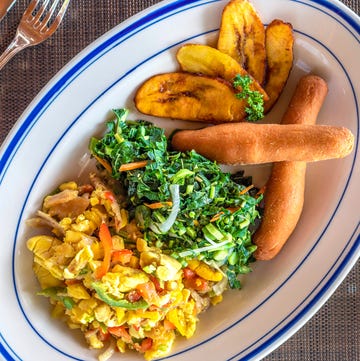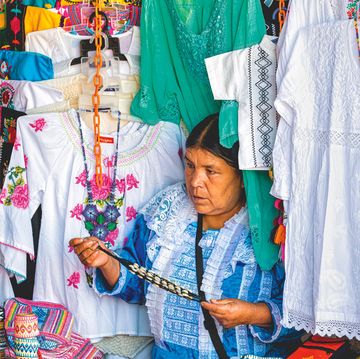Photo: Getty Images
Aimee Blaut is astonished. The Stockholm-based editor of The Formula has just handed me half a Balthazar croissant, and in two seconds, I've scarfed it down. This doesn't seem like a big deal, but Blaut's perfect red lips have formed a shocked "O" shape—the same kind of are-you-kidding-me expression that came with Prabal Guring's streaker.
"What?" I ask, lightly touching my mouth in search of leftover crumbs.
"I've never seen an American girl eat bread out in the open like that," coughs Blaut. "Not a fashion person in New York, anyway… or any of my friends in Miami…"
I raise an eyebrow, like, huh? But apparently, I've opened a floodgate, and Blaut launches into a half-hushed rant: "You get dirty looks when you eat bread in front of stylish Americans," she explains. "I'll be out with an editor, or a publicist, or… well, basically anyone… and if you order a sandwich or toast, they'll look at you like you're eating poo. Sometimes they'll say something, like, 'Gluten is just so rough for me' or sometimes they'll say 'Wow, good for you!' as if my bagel is an accomplishment. It makes me feel self-conscious. It's gotten to the point where when I'm out for dinner with a girlfriend, I'll wait and see if they take a roll from the bread basket before I can take one. Otherwise, even if I'm starving, I'll just wait."
Welcome to the era of Bread Shaming, where your ciabatta roll is suddenly everyone's business. "I get weird looks in the street," says Laure Ayel, a lithe blonde Parisian who works in advertising and lives in Manhattan, "because I am eating a piece of a fresh baguette, and the women make weird faces at me!"
"In Spain, bread is a fundamental element of every table," adds Carmen Lambarri, who moved from Madrid to New York City to work with Carolina Herrera, "And almost every day, we accompany [our meals] with baguette bread. But it's practically illegal to import bread into the US!"
Meanwhile, Shruti Ganguly—a native of Oman and India—just rolls her eyes when I ask if she's been Bread Shamed. "People love to look at the stuff on your plate," says the filmmaker (and bread fan) who produces projects with James Franco. "It's like a competition! But it's not fun… nobody ever wins."
"That's exactly what it is," says Isabel Foxen Duke, a health coach and emotional eating expert whose job is to help clients separate food and self-worth. "In [our] culture, women constantly compare their weight and their food intake with each other. Sometimes it comes out as a 'holier-than-thou' declaration, like, 'How can you eat that? It's so bad for you!' Note the people saying that are almost never doctors or nutritionists, by the way… but then there's also a competitive aspect some friendships foster around food. You'll think, 'If you have a piece of bread, am I allowed to have a piece of bread? If you have a piece of bread, am I stronger and better than you because I can resist it?' When Bread Shaming happens, it's because in a relationship, the bread is being used by weight-obsessed people as a substitute for worth or power. And the more obsessed someone is with their weight, and their worth compared to others' around them, then the more aggressive they'll be about it. So you just have to say, 'If you Bread Shame me, that's your fucking problem. Because I feel like when you do, you're really saying, I wish I were eating bread, too!'"
But for many women, publicly embracing a brioche isn't that easy. If you call out your circle of friends on their anti-bread behavior, "the truth is, you won't have a lot in common with people who are constantly dieting anymore," Foxen Duke acknowledges. "When a friend Bread Shames you and says 'Don't you know what's in that?' she's basically saying, 'Your ass is too big to eat bread.' That's the implication. And once you realize there's nothing wrong with you, there's something wrong with the system—when you say 'I accept my body and I accept my diet—you can't make me feel bad about my body, just because you feel bad about your body'—your social structure will naturally start to shift."
Model and lingerie designer Marissa Montgomery—a London native who spends half the year in Los Angeles—experienced that firsthand. After a night at New York's famous Waverley Inn—"where they passed around a heavenly bread basket, and at my table, even people's boyfriends weren't eating them!"—she found Bread Shaming so uncomfortable, she actually changed her friends. The last straw? "I had a pizza and movie night," she recalls. "I was in charge of the movie and my friends ordered the pizza… Only when it arrived it was not pizza, but wheat-free, gluten-free cardboard." After suggesting they order a "real" pizza, too, Montgomery was met with so many glares that she made a new social rule: "I love you if you eat carbs."
DJ and fashion week darling Chelsea Leyland agrees. "The thing is, life is too short," she sighs. "If you live in a city like New York or London [her childhood home], there are always fantastic new restaurants opening up. Why wouldn't you want to experience them? That's part of why you live somewhere exciting. For me, I can't just order a kale salad everywhere I go and still feel like I'm making the most of trying new things. And the thing is, most girls who make me feel gross about eating bread are the same ones smoking, and chewing gum, and drinking diet soda. I'd rather put gluten into my body than harmful artificial chemicals. Have you ever read the ingredients in those things? In the long run, they seem much more harmful."
Does that mean a new wave of Coke Zero Shaming could be on the horizon? "Oh, no!" Leyland laughs just before a DJ gig. "I think there should just be a truce, you know? Your plate is your business. My plate is mine. If we can share, great. If not, let's just talk about something else!"
"Friends let friends eat bread," Montgomery agrees from her London studio. "You can be my friend and eat whatever you want. But if you borrow my favorite shoes and don't return them," she winks, "That's when we'll have a problem."













